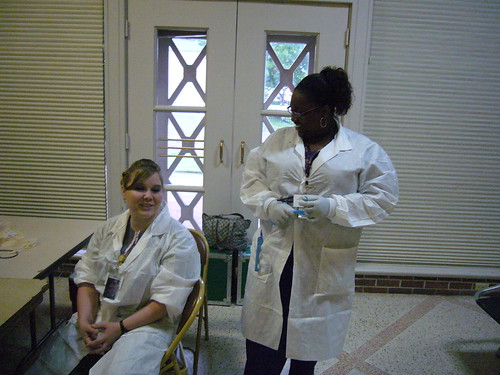CC image from joguldi on Flickr.
Why do many nurses work 12-hour shifts? For guidance, I turned to my mother, who worked as a nurse for many years:One reason is continuity of care. Patients have fewer people caring for them and are usually happier with a nurse they can get to know a little. Much easier staff scheduling for management as well.
Also, incentive for employment. During normal times when it's not really busy you can work 3 days a week and it's considered fulltime.Workers' productivities vary throughout their workdays, and it's likely that a nurse or anyone else will not be as sharp at the 11th hour of their workday as they were at the 1st hour. But, as Mom suggests, this trade-off may be more than compensated for by the fact that a patient doesn't have to deal with an endlessly revolving door of staff, with each shift having to brief the next on the patient's condition.
Another benefit for the nurses is that, by coming into work fewer days, they save on some costs that workers have to endure to get to work every day, most notably gasoline. And their schedules are not likely to coincidence with rush-hour traffic, making their commutes shorter.
Many other jobs, however, work better under the 9 to 5 schedule. For projects that require teamwork from several employees (or even several firms), it makes sense for the workers to all be there at the same time for more effective collaboration and communication. Additionally, many people prefer 9 to 5 because it gives them a predictable schedule week in and week out, making it easier to plan social events. Of course, with jobs such as nursing that require staffing 24 hours a day, not everyone can work "normal" hours.
For further reading, I suggest this NurseWeek article from 1998 and this diagram showing how the days-off schedule for 12-hour shifts could work out over a 2-week period.

No comments:
Post a Comment